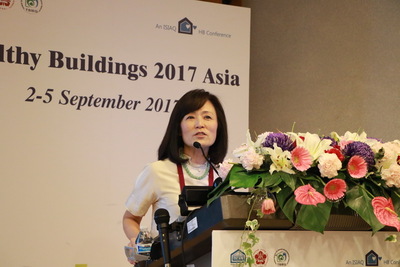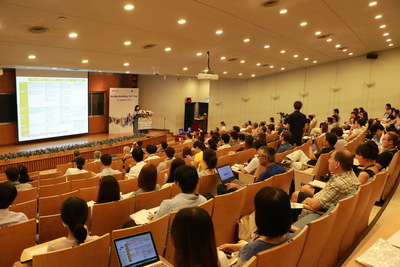NCKU President delivers a keynote speech about indoor air quality on Healthy Buildings 2017


In Healthy Buildings 2017 Asia, a conference on indoor air quality issues, President of National Cheng Kung University (NCKU) as well as the Conference President, Huey-Jen Jenny Su, ScD gave her 40-minute invited speech - Towards a Healthier and More Just Indoor Air Quality: Past, Current and Future Challenges in Taiwan, in which she discussed the causes and impacts of poor indoor air quality (IAQ) on human beings, especially some vulnerable groups.
In view of the environmental risks, many countries, such as U.S, Canada, Germany, and Australia, have already developed their IAQ management programs. Taiwan is among one of them that had progressed from the announcement of IAQ Guideline in 2005 to the enactment of IAQ Management Act in 2012.
Taiwan's IAQ Investigation had sampled 2779 sites from 1998 to 2016 in various public indoor settings. In spite of the research effort and law enforcement, environmental air problems remain serious. The attainment rates of indoor air pollutants, such as CO2, CO, O3, PM 2.5 and PM10 continue increasing.
The significant impact of global climate changes on IAQ has violated human health both physically and mentally through the ways of extreme heat, outdoor air quality, flooding, and infections.
Regarding future actions and challenges, President Su ended with 3 key points. First, human beings should take mitigation measures, such as reducing greenhouse gas emissions to improve our health and minimize the climate change.
Second, there's a strong need of further research to find the optimal approaches for potential mitigation measures and adaption in buildings, construction technologies and urbanism.
Finally, manage the indoor pollutants that lead to the health risk for vulnerable groups of people, such as children, the elderly, chronic patients, occupants in high-risk buildings and those waiting to be discovered.
In view of the environmental risks, many countries, such as U.S, Canada, Germany, and Australia, have already developed their IAQ management programs. Taiwan is among one of them that had progressed from the announcement of IAQ Guideline in 2005 to the enactment of IAQ Management Act in 2012.
Taiwan's IAQ Investigation had sampled 2779 sites from 1998 to 2016 in various public indoor settings. In spite of the research effort and law enforcement, environmental air problems remain serious. The attainment rates of indoor air pollutants, such as CO2, CO, O3, PM 2.5 and PM10 continue increasing.
The significant impact of global climate changes on IAQ has violated human health both physically and mentally through the ways of extreme heat, outdoor air quality, flooding, and infections.
Regarding future actions and challenges, President Su ended with 3 key points. First, human beings should take mitigation measures, such as reducing greenhouse gas emissions to improve our health and minimize the climate change.
Second, there's a strong need of further research to find the optimal approaches for potential mitigation measures and adaption in buildings, construction technologies and urbanism.
Finally, manage the indoor pollutants that lead to the health risk for vulnerable groups of people, such as children, the elderly, chronic patients, occupants in high-risk buildings and those waiting to be discovered.
Provider:
News Center
Date:
2017-09-11